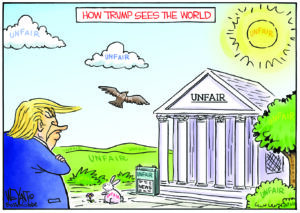Disaster Aid Bill Again Blocked in House by GOP Conservative
A long-overdue $19 billion relief measure, a top priority for some of Donald Trump's loyal allies on Capitol Hill, is once again delayed.WASHINGTON — A second conservative Republican on Tuesday blocked another attempt to pass a long-overdue $19 billion disaster aid bill, delaying again a top priority for some of President Donald Trump’s most loyal allies on Capitol Hill.
Rep. Thomas Massie of Kentucky said that if Democratic leaders like Speaker Nancy Pelosi thought the measure was so important, they should have kept the House in session in Washington late last week to slate an up-or-down roll call vote.
“If the speaker of this House thought that this was must-pass legislation, the speaker … should have called a vote on this bill before sending every member of Congress on recess for 10 days,” Massie said as he blocked the measure.
“You can’t have bills passed in Congress with nobody voting on them,” Massie said. “That is the definition of the swamp, and that’s what people resent about this place.”
Massie’s move earned swift rebukes from top Democrats. Sanford Bishop of Georgia said that his agricultural district was but one part of the country suffering from hurricane damage and that aid won’t arrive until well after the start of planting season. “Many will not be able to plant this year,” Bishop said. Hurricane Michael struck Georgia in the middle of last fall’s harvest season.
Another conservative, Texas freshman GOP Rep. Chip Roy, had blocked an earlier attempt Friday to pass the measure under fast-track rules, but Democrats tried again Tuesday. Bishop flew to Washington from Georgia to request the House pass the popular measure under fast-track procedures that permitted any individual lawmakers to block the bill.
Rep. Austin Scott, a Republican from Georgia, criticized his GOP colleagues for holding up the disaster bill, calling them “clowns” in a tweet.
Eventual passage of the bill, supported by Trump and top leaders in Congress, is a foregone conclusion. Trying again on Tuesday was a political freebie for Democrats, who went on the attack right after the vote.
“I cannot understand why any member would object to giving relief to so many millions of our citizens who have been badly damaged by natural disasters,” said No. 2 House Democratic leader Steny Hoyer of Maryland. Hoyer said the bill “will be passed overwhelmingly” when the House returns.
One concern of many House Republicans was a move by House Democrats last week to dump overboard Trump’s request for $4.5 billion to address the crisis of Central American refugees at the southern border.
Trump is a supporter of the measure, which swept through the Senate on Thursday in a rush to exit Washington for Memorial Day. Many Republicans, including southerners facing reelection, are frustrated that the bill has taken so long. After being denied his border money in a fight with House Democrats, Trump still embraced the bill, which directs much of its aid to political strongholds of his such as the Florida Panhandle and rural Georgia and North Carolina.
Passing legislation without any objection from anyone is often trickier to do in the House than the Senate, however.
“I just think a unanimous consent, voice vote, on the way out the door — there’s always, out of 535 (members of Congress), there’s always a few who think maybe that’s not appropriate,” said Sen. Kevin Cramer, R-N.D., a conservative who presided over a momentslong pro forma session of the Senate on Tuesday.
Cramer, who moved over to the Senate this year after spending three terms in the House GOP majority, also pointed out that the final disaster bill “actually took out some of the things that the House conservatives wanted,” such as billions of dollars to care for the influx of migrants seeking asylum after crossing the southern border.
There are also newer additions to the measure to help Midwestern areas suffering from springtime floods, along with large chunks of money to rebuild military bases such as Tyndall Air Force Base in Florida that were damaged by a string of disasters dating to last fall’s hurricane season. The measure ordinarily would have passed months ago, but Trump injected himself into the debate, demanding that funding sought by Puerto Rico’s elected officials, Republicans and Democrats both, be kept out.
Democrats held firm in demanding that Puerto Rico, a territory whose 3 million people are U.S. citizens, be helped by the measure. Their confidence was clear from the outset, and GOP resolve on Puerto Rico, never particularly strong to begin with, steadily faded as the impasse dragged on. The bill now contains more money for Puerto Rico, about $1.4 billion, than Democrats originally sought.
Roy said last week that lawmakers ought to go on record either way on the legislation, which is among the few significant bills to make it through the system despite the intense partisanship dominating Washington.
Your support matters…Independent journalism is under threat and overshadowed by heavily funded mainstream media.
You can help level the playing field. Become a member.
Your tax-deductible contribution keeps us digging beneath the headlines to give you thought-provoking, investigative reporting and analysis that unearths what's really happening- without compromise.
Give today to support our courageous, independent journalists.






You need to be a supporter to comment.
There are currently no responses to this article.
Be the first to respond.